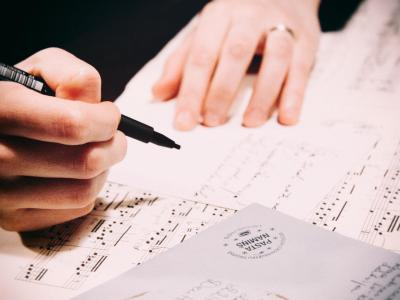In this undergraduate film course, you trace film music from the silent era to contemporary scoring, connecting stylistic trends to historical context. Through guided listening, score study, and film analysis, you examine archetypes, genre conventions, and evolving composer approaches across orchestral, popular, electronic, and global influences.
Key Learning Outcomes
- Analyze film music across major genres by identifying defining stylistic characteristics and conventions
- Trace the historical evolution of film music from the silent era to contemporary scoring practices
- Connect film music styles to their historical, cultural, and production contexts
- Compare orchestral, song-based, electronic, and hybrid scoring approaches across different periods
Course Description
If you’re even considering a career in film scoring, the material offered in this course is an essential introduction to understanding the traditional role of composers, as well as what the future of scoring looks like. Beginning in the late 1800s with silent films and through to the present day, this course provides an overview of the major stylistic trends and musical influences that led to the development of film scoring as a vital and living dramatic art form.
Films are never produced in a vacuum, but are products of their time and place; likewise, the music that is designed to support and accompany these films is no exception. To understand the concepts of clichés, archetypes, and other associative devices used by film composers, the student must go back to the original source, and consider the historical context. Even if you are taking the course for interest’s sake alone, you will be able to better appreciate the art and craft of effective film music, as you come to understand that nothing you hear happens by chance.
We will discuss and analyze the lives and works of significant composers, ranging from the romantic/operatic orchestral tradition to the influences of popular styles such as jazz, rock, and song scores. We will also examine more recent trends including electronic/synthesized scores and the influence of world music.
Each week’s lesson will begin with an introduction by your instructor containing an overview of a particular theme or topic; a look at the larger historical context of that topic; and substantial analysis of a variety of supporting materials (film and audio clips as well as thematic and harmonic score examples) both self-guided and with the direction of the instructor.
By the end of this course, you will be able to:
- Think critically about how music is paired with visuals to shape meaning and audience perception
- Explain how technology and production practices influenced film scoring conventions
- Support analytical claims using evidence from musical cues, themes, harmony, and orchestration
- Analyze archetypes and recurring musical ideas within historically significant film scores
Syllabus
Lesson 1: Early Film Music
- Functions of Film Music in the Silent Film Era
- Functions of the Musical Score
- Musical Accompaniment in Silent Films
- Assignment 1: Types of Music in Silent Film
Lesson 2: Late Silent Era and the Transition to Sound Film
- The Kinetoscope
- Imagery in Early Films
- The Music Cue Sheet
- Mood Headings
- The First Successful Compiled Score
- Oscar Micheaux and 'Race Films'
- Theater Ensembles Replaced by the Mighty Wurlitzer Theater Organ
- International Filmmakers Compete with Hollywood
- Assignment 2: The Theater Organ
Lesson 3: Early Sound Film and Romantic Influences
- Technical Methods of Sound Synchronization
- Challenges with Early Sound Films
- The End of an Era
- Oscar-Winning Composers
- Influences of the Late Romantic Era
- The European Émigrés: Max Steiner
- The European Émigrés: Franz Waxman
- The European Émigrés: Erich Korngold
- Assignment 3: The Adventures of Robin Hood (1938)
Lesson 4: The Hollywood Studio System
- The Major Studios, Part 1: The Big Five
- The Major Studios, Part 2: The Little Three
- Structure of the 'Hollywood Studio System'
- Alfred Newman and the Studio System
- The Newman Dynasty
- The Fox String Sound
- The Newman System
- Herbert Stothart
- Roy Webb
- Assignment 4: Roles in the Music Department
Lesson 5: European Nationalism and Film Noir
- European Nationalism in the Pre-War Era
- Expressionism
- Elements of Film Noir
- Bernard Herrmann: The Father of Modern Music in Film Noir
- Adolph Deutsch
- David Raksin
- Miklós Rózsa
- Miklós Rózsa: Discovery of the Theremin
- Assignment 5: Citizen Kane as Film Noir
Lesson 6: American Nationalism and Americana
- Aspects of Americana
- A Survey of the Americana Style through the Years: 1950s
- A Survey of the Americana Style through the Years: 1960s
- A Survey of the Americana Style through the Years: 1970s
- Hollywood in the Age of McCarthy
- Further Exploration: Avant-Garde
- Further Exploration: The Electronic Invasion
- Further Exploration: Forbidden Planet
- Assignment 6: The Best Years of Our Lives
Lesson 7: The Decline of the Studios and the Rise of Popular Music
- The Studio System in Decline
- Fighting Back with Innovation: 3D Movies
- Fighting Back with Innovation: Widescreen Projection
- Fighting Back with Innovation: Technicolor
- Fighting Back with Innovation: Drive-In Movies
- Fighting Back with Innovation: Stereo Sound
- Hollywood Blockbuster Films
- The Rise of Popular Music
- Assignment 7: Hollywood Strikes Back
Lesson 8: Birth of a New Era: The New Wave and the New Hollywood
- The Rising New Wave
- Hitchcock and Herrmann: Vertigo and Psycho
- New Approaches for the New Hollywood: Quincy Jones
- The Spaghetti Western and Ennio Morricone
- The Pop Song Takes Over and Two New Types of Film Composer
- The Song Score and Easy Rider
- Changing Times
- The Adapted Scores of Stanley Kubrick: 2001: A Space Odyssey
- Composers of Marketable Film Scores
- Hollywood’s Antiheroes and Their Scores
- Assignment 8: The Godfather and Building Suspense
Lesson 9: Classic Revival, Postmodern Influences
- Postmodernism: Identifying an Elusive Idea
- Jerry Goldsmith: Tradition Plus Innovation Equals Perfection
- The Original American Gladiator and the Dawn of Neoclassicism
- Back to the Golden Age: John Williams
- Assignment 9.1: Analysis of Williams’ Motific Approach
- James Horner: Star Trek: The Wrath of Khan
- Basil Poledouris: Conan the Barbarian
- Angela Morley: Watership Down
- Assignment 9.2: Comparison of Two Film Scores
Lesson 10: Synthesis and Hybrid Scores: Other Times and Other Places
- Music Synthesis: A Primer
- From the Disco to the Movie Theater: Giorgio Moroder
- Rise of the Machines: Wendy Carlos
- From Science Fiction to Horror: John Carpenter
- Self-Taught Synth Legend: Vangelis
- Popular Music Hits Its Stride
- A Return to Eclectic and Adapted Scores
- Assignment 10: Starting Your Comparison Paper
Lesson 11: New and Old: Branching Out to World Music and Returning to Classic Symphonic Scoring
- A Quick Survey of World Music Instruments
- World Music Film Composers
- Americana Revisited
- In Response to Vietnam
- Back to the Blockbuster
- Back to the Past
- Back to the Musical
- Back to the Newman Family
- Back to Kubrick: Jocelyn Pook and Eyes Wide Shut
- Back to Classic Film Genres
- Assignment 11: John Williams and the Land Race Sequence
Lesson 12: The New Millennium
- Further Developments in the New Millennium
- Concert Composers Cross Over
- In the Shadow of 9/11
- International Film Composers Come to the Fore
- Pop and Rock Artists as Film Composers
- Indie, Art-, and Alt-Rockers
- The New Millennials
- Bands as Film Composers
- Post-Millennial Composers
- Assignment 12: Comparison Paper
Requirements
Prerequisites and Course-Specific Requirements
Prerequisite Courses, Knowledge, and/or Skills
This course does not have any prerequisites.
Textbook(s)
- Reel Music: Exploring 100 Years of Film Music (2nd Edition) by Roger Hickman (W. W. Norton & Company, 2017)
- Recommended: Complete Guide to Film Scoring: The Art and Business of Writing Music for Movies and TV (3rd Edition) by Richard Davis (Berklee Press, 2010)
Student Deals
After enrolling, be sure to check out our Student Deals page for various offers on software, hardware, and more. Please contact support@online.berklee.edu with any questions.
General Course Requirements
Below are the minimum requirements to access the course environment and participate in Live Classes. Please make sure to also check the Prerequisites and Course-Specific Requirements section above, and ensure your computer meets or exceeds the minimum system requirements for all software needed for your course.
Mac Users
- macOS Monterey 12.0 or later
PC Users
All Users
- Latest version of Google Chrome
- Zoom meeting software
- Webcam
- Speakers or headphones
- External or internal microphone
- Broadband Internet connection
Instructors
Author & Instructor
Jack Freeman has been teaching courses in film music editing, composition, and history at Berklee College of Music since 1991. He also supervises and designs facilities and classrooms in support of the Berklee curriculum. Freeman has extensive experience in film and video production, working in the fields of network broadcast, cable, and community television, and is well-versed in a wide variety of analog and non-linear editing platforms. He has given seminars and demonstrations in film music for the "Grammy in the Schools" program among others, and has composed original music for a variety of documentary, industrial, and experimental films and video productions.
A native of Saskatchewan, Canada, Freeman received a bachelor of music in education degree from the University of Regina (SK), and a bachelor of music degree in film scoring from Berklee College of Music. He was an artist in residence for the Saskatchewan Band Association, conducting numerous clinics and workshops across the province, and composing and publishing several works for concert band. Freeman continues to play trombone and piano in a variety of settings in the Boston area, and assists non-profit groups in video production. Read Less
Instructor
Graham Peterson is an independent scholar and musician. He holds degrees in history and ethnomusicology from the University of New Hampshire and the University of Washington respectively. His research centers on issues in popular music, critical race theory, and music in media. Graham's research has been presented at national conferences for the Society for Ethnomusicology and the Society for American Music. In addition to his scholarly pursuits, Graham is also an active guitarist and has performed with ensembles in the Greater Boston Area, Seattle, and Cleveland.
What's Next?
When taken for credit, History of Film Music can be applied towards the completion of these related programs:
Related Certificate Programs
Related Degree Majors
Questions?
Contact our Academic Advisors by phone at 1-866-BERKLEE (U.S.), 1-617-747-2146 (INT'L), or by email at advisors@online.berklee.edu.





